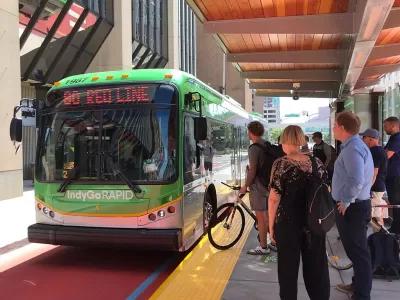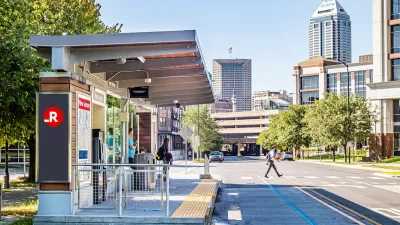A law proposed in the Indiana state legislature would ban dedicated bus lanes and force IndyGo to cancel a planned bus rapid transit line to the city's airport.

Kayla Dwyer reports on a state preemption effort that would effort to ban dedicated bus lanes from much of downtown Indianapolis, effectively canceling a planned bus rapid transit line that would connect downtown to the Indianapolis International Airport.
The proposed bill would prohibit IndyGo from building dedicated bus lanes outside of the Mile Square neighborhood, with lawmakers voicing concerns about increased congestion and delays for drivers. But an analysis of a plan that puts BRT lanes on the left side of the street showed that vehicle wait times at intersections wouldn't exceed the city standard of 55 seconds or less.
Since federal funding for the BRT project is contingent on dedicated bus lanes, the new law would cut short IndyGo's efforts to build the new line by eliminating $100 million in federal funds that are crucial to the $220-million project. In a statement, the agency said "This move would effectively cripple an entire system designed to provide improved, faster and more reliable transit for Marion County," expressing disappointment at lawmakers' reluctance to prioritize rapid transit.
At lawmakers' request, IndyGo presented two alternative designs, both of which would add millions to the total cost of the project and provide slower service for bus users.
IndyGo's BRT projects survived legislative peril last year, when lawmakers sought to hold the agency responsible for a higher percentage of its costs with Senate Bill 141, which failed to advance out of committee.
FULL STORY: Bill would 'cancel' IndyGo's Blue Line by banning dedicated bus lanes outside Mile Square

Alabama: Trump Terminates Settlements for Black Communities Harmed By Raw Sewage
Trump deemed the landmark civil rights agreement “illegal DEI and environmental justice policy.”

Planetizen Federal Action Tracker
A weekly monitor of how Trump’s orders and actions are impacting planners and planning in America.

How Atlanta Built 7,000 Housing Units in 3 Years
The city’s comprehensive, neighborhood-focused housing strategy focuses on identifying properties and land that can be repurposed for housing and encouraging development in underserved neighborhoods.

In Both Crashes and Crime, Public Transportation is Far Safer than Driving
Contrary to popular assumptions, public transportation has far lower crash and crime rates than automobile travel. For safer communities, improve and encourage transit travel.

Report: Zoning Reforms Should Complement Nashville’s Ambitious Transit Plan
Without reform, restrictive zoning codes will limit the impact of the city’s planned transit expansion and could exclude some of the residents who depend on transit the most.

Judge Orders Release of Frozen IRA, IIJA Funding
The decision is a victory for environmental groups who charged that freezing funds for critical infrastructure and disaster response programs caused “real and irreparable harm” to communities.
Urban Design for Planners 1: Software Tools
This six-course series explores essential urban design concepts using open source software and equips planners with the tools they need to participate fully in the urban design process.
Planning for Universal Design
Learn the tools for implementing Universal Design in planning regulations.
Caltrans
Smith Gee Studio
Institute for Housing and Urban Development Studies (IHS)
City of Grandview
Harvard GSD Executive Education
Toledo-Lucas County Plan Commissions
Salt Lake City
NYU Wagner Graduate School of Public Service





























